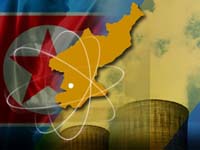Who is North Korea's 'Mr. Bomb?' Experts say it's hard to tell
The scientists who have propelled North Korea's decades-long nuclear program are, like much else in the tightly controlled communist country, shrouded in a deep veil of secrecy.

Experts say it's virtually impossible to pinpoint a single scientist who can be categorically identified as the "father" of North Korea's drive to tame the atom.
"There's no A.Q. Khan," said Bertil Lintner, author of a book on North Korea's leadership, referring to the Pakistani scientist credited with leading his nation's entry to the nuclear club and who admitted proliferating technology to North Korea, Iran and Libya.
Though nuclear development is always a group effort, it relies on the brains and willpower of key, often charismatic individuals who end up being lauded as the driving force of national atomic efforts.
"With Pakistan and other countries, they've got 'Mr. Bomb,"' said Peter Beck, Seoul-based North Korea analyst for the conflict resolution think-tank International Crisis Group. "It's possible at some point this person will be identified, but it's only if the North wants (the world) to know."
Indeed, experts generally agree that in North Korea, any scientific stars have been largely subsumed, like most endeavors there, into a collective effort under draconian supervision and in any case, all major advances are attributed to leader Kim Jong Il or his late father, founding ruler Kim Il Sung.
"North Korea is the most closed society in the world," said Kim Kyoung-soo, a professor at Seoul's Myongji University and editor of a book on Pyongyang's nuclear program. "We don't have public access to their documents."
Still, among North Korean scientists there is a "handful who truly have been pivotal, and without their drive and experience, their nuclear program would not have proceeded to the point where it is today," said Joseph Bermudez, a senior analyst at Jane's Information Group who specializes in North Korean defense and intelligence.
The origins of the North's nuclear quest, which culminated in its announcement that it carried out an underground test explosion Oct. 9, can be traced to the end of World War II.
That brought the liberation of the Korean Peninsula from decades of Japanese rule, but also its split into rival capitalist and communist camps in the North and South.
Some of the scientists credited with helping lay the foundation for a nuclear program after 1945, such as To Sang Rok and Lee Sung Ki, studied at Japanese universities during the colonial period. Both are dead, reports AP.
Another influential figure, Seo Sang Guk, studied in the 1950s along with many other North Korean scientists in the Soviet Union, which played a major role in the country's nuclear development. Seo is thought to live in the North.
"He is viewed as a so-called genius," Hwang Jang Yop, who held a key position in the North's ruling Workers Party and is the highest- ranking official to defect from the country, told The Associated Press in an interview.
The most enigmatic purported North Korean nuclear scientist may be a man identified in various reports as Kyong Won Ha.
Subscribe to Pravda.Ru Telegram channel, Facebook, RSS!


